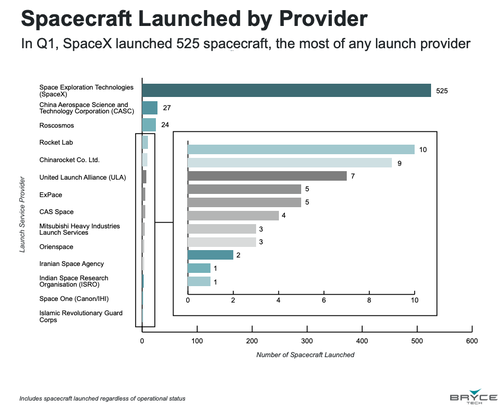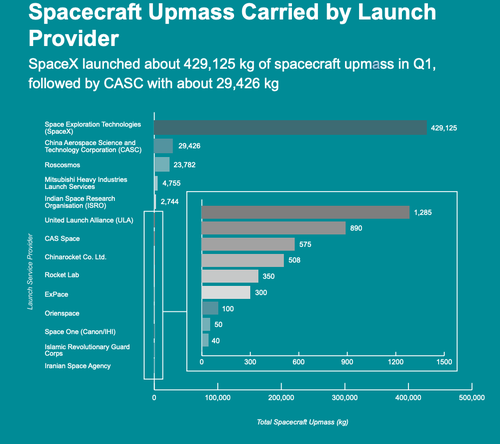
Amazon's rival to Elon Musk's Starlink, Project Kuiper, is running into delays. The company now anticipates Kuiper's first batch of low-Earth satellites will be launched late in 2024, versus the early projection of the first half of this year. Customer testing is not expected until 2025.
"We expect to ship our first completed production satellites this summer, and we're targeting our first full-scale Kuiper mission for Q4 aboard an Atlas V rocket from ULA [United Launch Alliance]. We will continue to increase our rates of satellite production and deployment heading into 2025, and we remain on track to begin offering service to customers next year," Amazon wrote in a blog post on Thursday.
PCMag said beta trials of the internet-from-space service for commercial customers were initially slated for later this year and will now begin sometime in 2025.
Amazon told the tech blog, "We expect to begin offering demonstrations to enterprise customers in early 2025."
Amazon has not revealed the reason behind Project Kuiper's delays, but it's possible that the dismal testing of Jeff Bezos' Blue Origin rockets is to blame.
Meanwhile, SpaceX's Starlink is soon becoming the global leader in high-speed internet from space, with a constellation of nearly 6,000 satellites and more than three million terminals operating across 75 countries.
We recently pointed out that, using data from BryceTech, SpaceX is leading the world's rocket race—great news for America's rocket program. Most of the rocket launches have been boosting Starlink satellites to low-Earth orbit.
Musk is quite literally America's rocket program: SpaceX launched about 429,125 kg of spacecraft upmass in the first quarter, significantly outpacing China's rocket program (China Aerospace Science and Technology Corporation), which launched a measly 29,426 kg.
And just wait until SpaceX's Starship is cleared for commercial launches.
Let Starship be a reminder to not bet against the greatest entrepreneur of our time, Elon fuckin Musk pic.twitter.com/iIrFO9nEjX
— Teslaconomics (@Teslaconomics) March 14, 2024
Bezos' Blue Origin appears to be a sore loser as it falls behind SpaceX. Last week, Musk said Bezos' rocket company was attempting "to impede SpaceX's progress by lawfare."
It's interesting to note that Blue Origin was founded by Bezos in 2000. Two years later, Musk founded SpaceX, which achieved orbit in 2008. Since then, SpaceX has had hundreds of rocket launches and multiple crewed missions to the International Space Station. Meanwhile, Blue Origin has yet to achieve orbit in 2024.
Year founded:
— Sawyer Merritt (@SawyerMerritt) June 25, 2024
• Blue Origin: 2000
• SpaceX: 2002
Year when the company’s reached orbit:
• SpaceX: 2008
• Blue Origin: Never
It's evident that Bezos' rocket company and Amazon's space internet startup are lagging behind Musk's SpaceX.
Amazon’s rival to Elon Musk’s Starlink, Project Kuiper, is running into delays. The company now anticipates Kuiper’s first batch of low-Earth satellites will be launched late in 2024, versus the early projection of the first half of this year. Customer testing is not expected until 2025.
“We expect to ship our first completed production satellites this summer, and we’re targeting our first full-scale Kuiper mission for Q4 aboard an Atlas V rocket from ULA [United Launch Alliance]. We will continue to increase our rates of satellite production and deployment heading into 2025, and we remain on track to begin offering service to customers next year,” Amazon wrote in a blog post on Thursday.
PCMag said beta trials of the internet-from-space service for commercial customers were initially slated for later this year and will now begin sometime in 2025.
Amazon told the tech blog, “We expect to begin offering demonstrations to enterprise customers in early 2025.”
Amazon has not revealed the reason behind Project Kuiper’s delays, but it’s possible that the dismal testing of Jeff Bezos’ Blue Origin rockets is to blame.
Meanwhile, SpaceX’s Starlink is soon becoming the global leader in high-speed internet from space, with a constellation of nearly 6,000 satellites and more than three million terminals operating across 75 countries.
We recently pointed out that, using data from BryceTech, SpaceX is leading the world’s rocket race—great news for America’s rocket program. Most of the rocket launches have been boosting Starlink satellites to low-Earth orbit.
Musk is quite literally America’s rocket program: SpaceX launched about 429,125 kg of spacecraft upmass in the first quarter, significantly outpacing China’s rocket program (China Aerospace Science and Technology Corporation), which launched a measly 29,426 kg.
And just wait until SpaceX’s Starship is cleared for commercial launches.
Let Starship be a reminder to not bet against the greatest entrepreneur of our time, Elon fuckin Musk pic.twitter.com/iIrFO9nEjX
— Teslaconomics (@Teslaconomics) March 14, 2024
Bezos’ Blue Origin appears to be a sore loser as it falls behind SpaceX. Last week, Musk said Bezos’ rocket company was attempting “to impede SpaceX’s progress by lawfare.”
It’s interesting to note that Blue Origin was founded by Bezos in 2000. Two years later, Musk founded SpaceX, which achieved orbit in 2008. Since then, SpaceX has had hundreds of rocket launches and multiple crewed missions to the International Space Station. Meanwhile, Blue Origin has yet to achieve orbit in 2024.
Year founded:
• Blue Origin: 2000
• SpaceX: 2002Year when the company’s reached orbit:
• SpaceX: 2008
• Blue Origin: Never— Sawyer Merritt (@SawyerMerritt) June 25, 2024
It’s evident that Bezos’ rocket company and Amazon’s space internet startup are lagging behind Musk’s SpaceX.
Loading…







